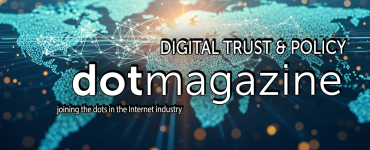2022 could be a year of new beginnings and change if the new German government makes good on its plans for a strategic reorientation of digital policy, makes up for the digital policy failures of recent years and we all focus even more strongly on the enormous opportunities that digitalisation offers for many of the great challenges of our time.
In this context, Oliver Süme, Chair of the Board of eco – Association of the Internet Industry, calls for a consistent and holistic digital strategy that sees digitalisation as part of the solution, thinks about the innovative effects of digital infrastructures, technologies and services from the very beginning and thus uses existing innovation potential more consistently than before.
2021 has shown us that crises can only be controlled to a limited extent and that the new normal created by Covid-19 will probably accompany us for much longer than initially assumed. But crises always have their upsides. They force us to find solutions, to force change, to go new ways.
The Covid-19 pandemic has set developments in motion in Germany and around the world – especially in the digital sector – that might have taken decades longer under other circumstances: flexible and mobile working, digital teaching from home, virtual forms of communication and collaboration in the professional and private spheres, the accelerated digitalisation of many economic sectors and the transformation of analogue business models into the digital. We often talk about the disruptive effect of technological innovations, in this case the disruption happened through the virus, but digital technologies are the key to shaping this disruption.
And this is not only true for dealing with the pandemic. Digitalisation is part of the solution to many challenges that we will have to face in the coming years – with or without the pandemic – whether it is dealing with climate change, dealing with demographic change or even the constant struggle for democracy and participation around the world.
Strengthening trust and security on the net
However, incidents such as the Log4J security breach, which became known in mid-December, repeatedly make us aware of the vulnerability of our thoroughly digitalised society, infrastructures and economy, which can be significantly compromised by cyber attacks.
I therefore see a particularly urgent need for action in the area of trust and security, because without trust in the security and integrity of the digital world, it will not be possible to tap the economic and social potential of the digital transformation.
As a key technology, IT security is more important than ever before due to the digitalisation of central areas of public services and industry. Here, we welcome the planned promotion of security by design, the closing of security gaps, a strengthening of the Federal Office for Information Security (BSI), the plans for more efficient vulnerability management and the codification of approaches such as the right to encryption.
With the planned surveillance bill, the German government strengthens the civil liberties of citizens and creates an important basis for more transparency vis-à-vis state surveillance powers. The clear rejection by the new German Minister of Justice, Marco Buschmann, of the idea of data retention without a specific reason gives us hope that the new federal government will also open a new chapter for a constructive and moderate security policy in this respect.
Dare to act
One thing is clear: the digital transformation must be shaped politically, needs a strategy and a framework that promotes innovation, offers companies legal certainty and economic room for manoeuvre, and at the same time protects the rights of users.
I am confident that the new German federal government, with the establishment of the Ministry for Digital Affairs and Transport, has recognised the urgency of a new start in digital policy in Germany and will quickly tackle the existing challenges, for example in the areas of digital administration, digital infrastructure and digital education.
The topic of digitisation can be found in almost all chapters of the coalition agreement and thus duly reflects the importance of the cross-cutting topic of digitisation. The will of the future federal government to make a digital breakthrough is clearly evident. The approaches addressed in the coalition agreement address the right topics and show the need for action.
In the coming years, it will be crucial for the new German federal government to implement a consistent and at the same time ambitious digital policy across all ministries. In our view, this requires an overall digital strategy that provides a clear roadmap for the digital transformation in Germany.
Seizing digital opportunities
One topic that I would like to emphasise more strongly in the context of “opportunities of digitalisation” is the topic of sustainability. We have been pointing out for a long time that these two topics need to be thought together because digital infrastructures and digital technologies and services offer great potential for tackling climate change and other sustainability goals. Bringing forward the coal phase-out to 2030 is ambitious. For this, a massive expansion of renewable energies and their availability is absolutely necessary in order to constructively flank the associated challenges for the economy, especially data centres, which are now already to be operated in a climate-neutral manner by 2027. The planned end of the Renewable Energy Sources Act (EEG) levy from 2023 will also be helpful here.
One thing is clear: accelerated digitisation not only contributes to environmental and climate protection through the CO2 savings potential, but also makes a significant contribution to achieving the climate goals.
A 2022 digital policy oriented towards sustainability principles must consider such effects of digital innovations from the outset and integrate them into an overall regulatory concept in the long term, instead of merely establishing rules for CO2 savings in data centres in the short term.
This does not only concern direct energy policy aspects. A rapid expansion of networked mobility and a strengthening of the technology location with regard to innovative technologies such as AI will also have a positive effect on sustainability and climate protection goals in the medium term.
My wish for 2022 is that we will conduct this debate on the climate and sustainability effects of digitalisation even more intensively between politics, business and civil society, and that we will succeed above all in raising it to a fact-based level. We will contribute to this with eco through studies and discussion formats and look forward to a constructive exchange.
2022 – like 2021 – holds many uncertainties, especially with regard to further pandemic developments. This makes it all the more urgent that we develop a clear and long-term roadmap on how we want to deal with this challenge and other developments in our environment and our society in the future. Digitalisation will continue to offer us effective and powerful solutions here in the future. It is up to us to use them in such a way that as many people as possible can benefit from these solutions.




